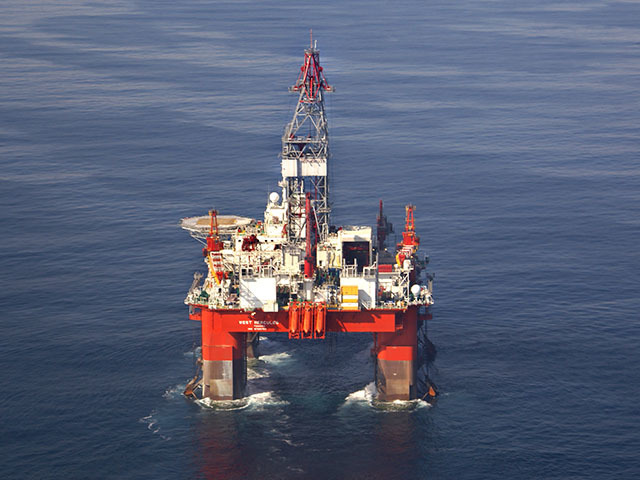
The deep-ocean strategy is coming back to bite South Korean shipyards.
Hyundai Heavy Industries Co., Daewoo Shipbuilding & Marine Engineering Co. and Samsung Heavy Industries Co. — South Korea’s Big Three shipbuilders — ventured into offshore oil rigs starting around 2010. The goal was to avoid direct competition with China, where inexpensive labor could churn out low-profit tankers at cheaper rates. With oil prices climbing toward $100 a barrel, offshore rigs seemed like a savvy bet.
Today the strategy seems to have backfired. Struggling with technology and a plunge in oil prices that has discouraged exploration, Korean vessel makers are racking up debt and could show billions of dollars in losses when they report earnings starting Monday. It’s the latest example of difficulties for the global shipbuilding industry, after a glut of vessels and low freight rates have spelled financial trouble for Chinese yards in recent years, prompting them to seek government aid.
The Big Three “excessively competed to win offshore plants to make up the gap caused by falling demand for ships,” Yang Jong Seo, a research fellow at the Korea Eximbank Overseas Economic Research Institute, a government think-tank, said by telephone. “That excessive competition was their biggest mistake.”
Shares of Samsung Heavy were up 1.5 percent at 13,700 won Hyundai Heavy were up 1 percent at 100,500 won as of 11:26 a.m. Monday in Seoul. Daewoo Shipbuilding shares were down 3.4 percent at 7,380 won.
Economic Mainstay
Shipbuilding has been central to South Korea’s economy since the 1970s. Ships accounted for 8.5 percent of the country’s total exports through June 20 of this year, up from 7 percent for all of 2014, according to the trade ministry.
Worldwide, the shipbuilding industry is seeing fewer orders as a sluggish global economy and low freight rates discourage ship owners from buying new vessels. Last year, China Rongsheng Heavy Industries Group Holdings Ltd., once the nation’s biggest shipyard outside government control, was forced to seek financial aid.
This week is a test for the Big Three as they begin reporting second-quarter earnings. Analysts forecast the companies will post profits, but shares of the three companies have been plunging on media reports of a challenging quarter.
Samsung Heavy, which reports Monday, may show a 1 trillion won ($856 million) loss, according to EToday. Hyundai Heavy earnings are due out Wednesday. The two companies declined to comment on their earnings and the impact offshore rigs have had on margins.
Daewoo Ship Earnings
Daewoo Shipbuilding, which releases earnings Aug. 14, may report a loss as large as 3 trillion won, according to local newsprovider Yonhap Infomax. CEO Jung Sung Leep told employees Daewoo Shipbuilding can probably avoid a debt restructuring but will need to sell assets, cut costs and relocate staff, the company said in a July 20 statement.
In an e-mailed response to Bloomberg on July 24, Daewoo Shipbuilding said it expects a second-quarter loss in large part because of the offshore rig projects, where a lack of experience led to errors of design and process that greatly inflated costs. The company said it would reflect the entire loss in the second quarter.
Daewoo Shipbuilding shares are down 60 percent this year, Samsung Heavy shares have fallen 31 percent and Hyundai Heavy shares are down 13 percent. Korea’s benchmark Kospi index is up 6.5 percent since the start of the year.
Offshore Move
The move into offshore drilling rigs began in earnest around 2010, as the global slowdown and competition from cheaper Chinese companies challenged the Big Three’s traditional business. With oil prices rising and Chinese shipyards unable to build sophisticated rigs, the offshore business seemed to promise higher profits and less competition.
It didn’t work out that way. Crude oil prices collapsed 60 percent from June 2014 to March 2015, damping demand for drilling rigs. What’s more, Korean companies used to working on rig projects at depths of 1,000 meters or less found deep-sea construction more complicated and costly.
“It took more effort than they expected,” KERI’s Yang said. “It turned out to be a bit of a challenge.”
The timeframe to build a rig — about 40 months, compared to 18 months for a tanker ship — and the common practice of backloading most payment until delivery has left the companies burning through cash.
Cash Crunch
At Daewoo Shipbuilding, available cash fell to 87.9 billion won in the first quarter of 2015 from 238 billion won a year earlier. Samsung Heavy’s cash position fell to 152.2 billion won in the first quarter from 1.1 trillion just six months earlier.
“I think the current situation is the bottom for the shipbuilders,” Yang said. “South Korean shipbuilders will be able to recover from this slump. They should learn from their mistakes and focus on increasing their technical competitiveness.”
Recommended for you
